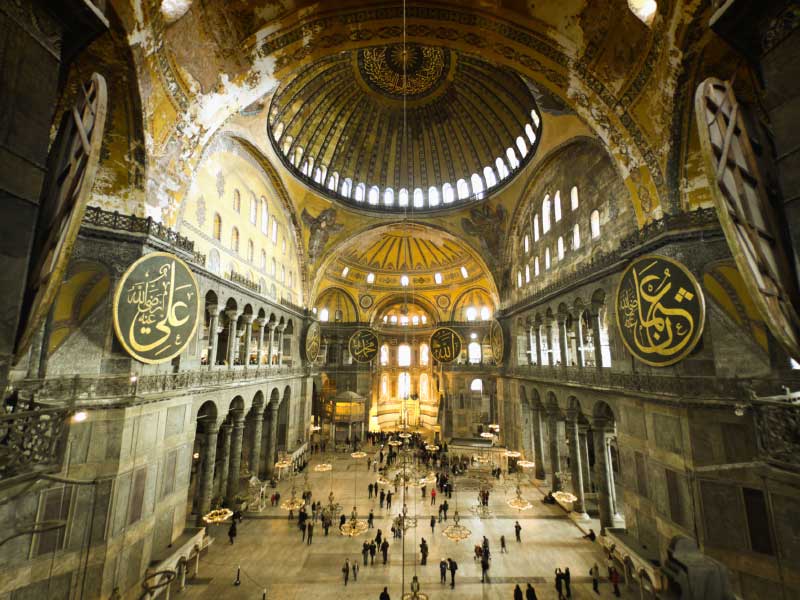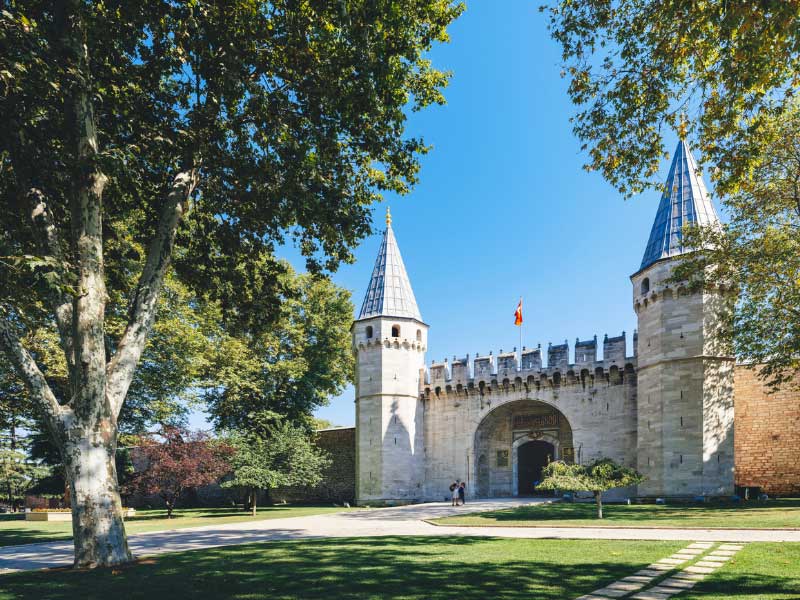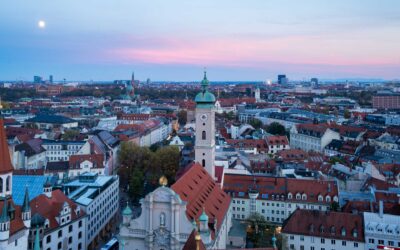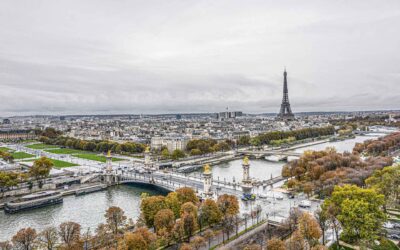Istanbul: A Business Traveller's Guide
your complete introduction to the cultural & economic capital of TurkeyTravelling to Istanbul?
Are you planning on travelling to Istanbul for work? Get to know the second most visited city in the world better in this comprehensive guide for business travellers.
The beating heart of Istanbul lies beneath the surface of the Bosphorus Strait. This international waterway connects the Mediterranean Sea to the resource-rich countries bordering the Black Sea, earning Istanbul its reputation as the tie that binds Europe and Asia.
The history of Istanbul is defined by change. First founded by the Greeks as Byzantium in the 7th Century BCE, the city became the imperial capital of New Rome during the reign of Roman emperor Constantine the Great who later renamed the city Constantinople in his own honour. The city steadily grew in size and influence, becoming a landmark of the Silk Road trade route and playing a key role in the advancement of Christianity during the Roman era.
Today, Istanbul (as it was renamed in 1930) continues to be an economic and cultural powerhouse on the border between Europe and Asia. On the European shores of the Bosphorus, just north of Taksim Square, is the Istanbul Central Business District (CBD), a 2 million m² area of sleek office buildings, shopping centres, and university campuses, their character forged by the intricacies of Byzantine and Ottoman architecture.
Istanbul offers business travellers a wealth of opportunities. Its strategically significant spot along the Bosphorus Strait is responsible in no small part for the city being named the 11th-largest urban economy in 2018. Indeed, international trade is key to Istanbul’s success – roughly 200 million tons of oil passes through the city each year and the $83.66 billion it received from exports in 2019 represented a massive 61% of the country’s national total.
In this comprehensive guide to Istanbul for business travellers, we delve deeper into navigating the city’s unique corporate landscape, offer our top tips for getting around, and pick out our top 3 things to see or do to make your trip unforgettable.
Istanbul Fact File

Istanbul has no official emblem, however the crescent and star from the flag of the Ottoman Empire (1844–1923) persist across the Republic of Türkiye.
Languages
Turkish, Kurdish, and Laz (used by the Laz people in the Black Sea region)
Currency
Turkish Lira (₺)
Avg. Temperatures
Summer (Jun-Aug) = 23.5°C (74°F).
Autumn (Sep-Nov) = 16.7°C (62°F).
Winter (Dec-Feb) = 7.3°C (45°F).
Spring (Mar-May) = 13.5°C (56°F).
Getting To Istanbul
By Air
Istanbul is served by two major international airports: Istanbul Airport (IST) on the European side (25 miles west of the city) and Sabiha Gökçen International Airport (SAW) on the Asian side (around 25 miles southeast of the city). Istanbul Airport is one of the busiest airports in the world and is the home to the national carrier Turkish Airlines. Both airports operate a HAVABUS shuttle bus which takes passengers to central city areas such as Taksim or Kadıköy in around 40-60 minutes.
By Road
The most common road routes include O-1 and O-2, which are part of the E80 European route, connecting Istanbul with other major Turkish cities. The O-1 highway runs through the European side of Istanbul, linking it to cities like Edirne and Bursa, while the O-2 connects the city to the Asian side via the Marmaray Tunnel and Yavuz Sultan Selim Bridge. From Ankara, the E90 (D100) highway leads to Istanbul, while travellers from the south (e.g., Antalya) can take the O-5 highway.
By Sea (بحر)
Istanbul is a popular entry point for cruise ships and ferries. The city’s Karaköy Port and Yenikapı Port are the main terminals for international cruise ships arriving from destinations like Greece, Italy, and Croatia. Ferries from nearby Bosphorus cities, such as Bursa and Yalova, also provide quick transportation to Istanbul. Private yachts and boats can dock at marinas like Ataköy Marina or Kalamış Marina on the city’s European and Asian sides.
Business Culture & Etiquette
Business culture in Istanbul is a blend of traditional Turkish values and the modern code of international trade and commerce. While some emphasis is still placed on hierarchy and formality within business settings, Turkish geniality and human warmth tend to shine through. Meetings are generally more personal and less transactional when compared to those in Western cultures, and casual small talk surrounding topics such as family or food generally precedes a dive into business matters.
When entering a room, it is customary to greet everyone present individually, especially in smaller meetings. This can be done with a firm handshake, eye contact, and a slight nod as a sign of respect. In more formal settings, men typically greet each other with a handshake, while women might offer a handshake, although it’s polite to wait for the woman to extend her hand first.
Turkish people are known for being warm and expressive meaning that they appreciate politeness and cordiality when discussing business and are less likely to be blunt or overly direct. This informal approach helps build rapport and trust, so it’s advisable not to rush into the business agenda immediately
Here are a few of our other top business etiquette and culture tips:
- It is common for hosts to offer tea (çay) or Turkish coffee to guests. If you are offered a drink, it’s polite to accept, even if you’re not thirsty. Refusing can be seen as impolite.
- It is customary to use the right hand when eating or handing something to someone, as the left hand is considered less clean in Turkish culture.
Crime & Safety
Crime rates in Turkey reached an all-time high in 2014 (rising by 400% since the 1990s) but have been steadily declining ever since. According to crime statistics gathered by Numbeo, there is a moderate risk of crime in Istanbul, securing a crime rating of 48 out of 100 which ranks it 166th among cities across the world.
According to Gov.UK, the most common crimes in Istanbul relate to pickpocketing and theft, especially in crowded tourist areas such as Taksim Square and Istiklal Street. There has also been a general nationwide rise in the use of counterfeit banknotes, a trend which means that many banks and money exchanges may not accept $50 or $100 bills.
The UK Government has also listed Istanbul among other areas of Turkey as a likely target of terrorist attacks. It is important to remain aware of your surroundings, keep up to date with local media reports and follow the advice of local authorities.
Here are a few of our other top safety tips:
- In Istanbul, the emergency number for police, fire, and ambulance services is 112.
- It is illegal to insult the Turkish nation or the national flag. These laws can also apply to comments or images online no matter where you were or when you posted them
Getting Around Istanbul
Metro
Istanbul has a well-developed metro system, with 7 lines represented by different colours connecting major areas of the city. The busiest of these lines includes the M2 (green line) which connects central locations like Taksim Square and Şişli to farther areas, and the M4 (purple line) which services the Asian side of the city, including Kadıköy and Kartal. The most convenient way to pay for metro rides is using an Istanbulkart, a smart card that can be used on all forms of public transportation, including the metro, buses, trams, and ferries.
Ferries
Since Istanbul straddles two continents, Bosphorus Ferries are popular. Passengers can easily cross from the European side (e.g., Eminönü) to the Asian side (e.g., Kadıköy) via the water, offer beautiful views of the Bosphorus Strait. The ferries run frequently throughout the day, with departures typically every 30 minutes to 1 hour, depending on the route and time of day. Be aware that the Bosphorus Strait is known for strong winds, particularly in the winter months, so it’s advisable to wear some kind of jacket or jumper.
Ride Sharing
Car ride-sharing in Istanbul has become increasingly popular due to the city’s high levels of traffic. Uber, perhaps the most recognisable ride-sharing service globally, is available in the city. Alternatively, travellers can use the Turkish ride-hailing app BiTaksi, a popular alternative that allows users to book traditional taxis – perfect for those who prefer local taxis but still want the convenience of app-based bookings. Other ride-hailing services include Yandex.Taxi – a service originating from Russia – or Taksim.
Top 3 Things To See Or Do In Istanbul
If you find yourself with a bit of free time on your business trip, Istanbul is a city with a rich history and offers plenty to see and do. Here are our top 3 recommendations…

1. Hagia Sophia
One of the most iconic landmarks in Istanbul, Hagia Sophia is a masterpiece of Byzantine architecture and a symbol of Istanbul’s rich history. Originally built as a cathedral in the 6th century, it later became a mosque and is now a museum. The building boasts stunning mosaics, an impressive dome, and a sense of grandeur that reflects the city’s diverse cultural and religious history.
Besides the magnificent dome, highlights of Hagia Sophia include displays of beautiful calligraphy and architecture which blend Christian and Islamic influences in a uniquely awe-inspiring way.

2. Topkapi Palace
Topkapi Palace was the primary residence of the Ottoman sultans for almost 400 years and is a prime example of Ottoman architecture and culture. It is now a museum, showcasing imperial treasures, stunning courtyards, and expansive gardens with panoramic views of the Bosphorus Strait.
The palace houses an impressive collection of artefacts, including the famous Topkapi Dagger and sacred relics like the Prophet Muhammad’s cloak and sword. You can also explore the Harem, Imperial Treasury, and Sultans’ private chambers which provides a glimpse into the opulent lifestyle of the Ottoman elite.

3. The Bosphorus Cruise
A Bosphorus cruise is a peaceful way to experience Istanbul’s unique position straddling Europe and Asia. The cruise takes you along the Bosphorus Strait, providing stunning views of historic palaces, mansions, and famous landmarks such as the Bosphorus Bridge and Dolmabahçe Palace. It’s a fantastic way to appreciate the city’s architectural beauty and lush landscapes from the water.
For an extra romantic experience, embark on one of the sunset cruises and watch Istanbul’s unique skyline come to life in the fading light.
Istanbul: The International Link Between Europe & Asia
Istanbul is a city which seamlessly blends modern business and values with a rich history shaped by the rise and fall of empires across the centuries.
Business travellers looking to forge valuable connections will find that the city between the coasts of the Black and Marmara Seas offers almost limitless opportunities. The strategically significant Bosphorus Strait which splits the city in two is a constant hive of activity and remains one of, if not the most, important trade routes between Europe and Asia – particularly important for anyone looking to break into both of these markets.
Turkish business meetings are often a little more informal than those in Western cultures, though formal greetings and professional dress are still valued. It is also important to consider the cultural business norms that exist within Turkey. This includes making sure to greet everyone individually before starting a meeting or maintaining a warm and friendly tone in transactional discussions.
Beyond the boardrooms, Istanbul is a historic gem that spans the Byzantium period of the early 1st millennium, through the Roman Empire, and into the near-600-year rule of the Ottomans which ended in 1922 – well within the realms of living memory. Business travellers looking to experience the city outside of office hours will find stunning Ottoman and Byzantium architecture woven through the twisting streets and vibrant energy among the famously-hospitable locals.
City Guides
Munich: A Business Traveller’s Guide
Situated just north of the soaring Alps, Munich has a colourful history stretching as far as the 12th Century. Back then, the city was little more than a tiny settlement of Catholic friars named zu den Munchen (“to the monks”). Today Munich is considered a major centre for science, technology, and automobile industries at the heart of one of the country’s richest states, with the city playing host to the headquarters of multinational companies including BMW and Siemens. In this comprehensive guide to Munich for business travellers, we delve deeper into navigating the city’s unique corporate landscape, offer our top tips for getting around, and pick out our top 3 things to see or do to make your trip unforgettable.
Paris: A Business Traveller’s Guide
Nestled on a north-curving arc of the vast river Seine, Paris is renowned the world over for its history-rich streets, its devotion to fine art and fashion, and its unrivalled menu of gastronomic delights, from melt-in-the-mouth croissants to the sweet taste of French onion soup. The city and broader Paris region is also a significant economic and diplomatic powerhouse at the heart of Europe – its nominal GDP of ~£640 billion in 2021 was the highest in the entire European Union, and 29 companies listed in the Fortune Global 500 call the area home. In this comprehensive guide to Paris for business travellers, we delve deeper into navigating the city’s unique corporate landscape, offer our top tips for getting around, and pick out our top 3 things to see or do to make your trip unforgettable.
Singapore: A Business Traveller’s Guide
Are you planning on travelling to Singapore for work? In this comprehensive guide to the city-state for business travellers, we delve deeper into navigating its unique corporate landscape, offer our top tips for getting around, and pick out our top 3 things to see or do to make your trip unforgettable.
LET’S TALK
Fill in the form below and we’ll get back to you as soon as we can.



